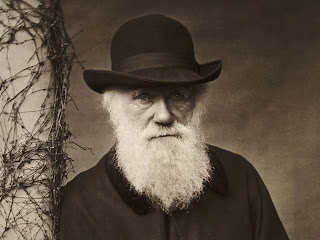The Honest Confessions of Rev. Ben Fiddian: a Darwinian Christian Zoologist
Evolutionary theory was the assumed framework of every course I studied as an undergraduate biosciences student. In some courses it was the explicit focus. In others, it was more implicit because it provides the structure by which many different strands of biology can be functionally interlinked in intellectually insightful ways.
After my degree I went straight into research work at Cambridge University Department of Zoology. It was a place where you could take the theory of evolution for granted - no one would ever think to challenge it. They have recently opened a new centre, named after the popular contemporary TV spokesman of evolution, Sir David Attenborough.
On one occasion whilst working at Cambridge, I was offered a job at the ‘Faraday Institute for Christianity and Science’, after a warm and informal discussion with its director, Dr Dennis Alexander. The Faraday Institute is known for promoting a ‘theistic’ approach to the theory of evolution - the idea that the first few chapters of Genesis are poetic or mythical and that God used evolution to create the world.
Also, within the Cambridge system I applied to become a member of Darwin College, named after Charles Darwin, the pioneering evolutionary thinker and author of ‘Origin of the Species’. The college is located around property that was owned by the Darwin family. Every day after dinner we would sit and drink coffee in ‘the reading room’, a picture of Charles hung on the wall in pride of place.
Hand on heart, these were some of the most formative and enjoyable years of my life.
Right. Hands up how many Christians reading this are thinking “I never knew Ben went in for that evolution thing”. Come on, be honest! That is what you are thinking, is it not?!
So let me speak a word or two in my own ‘defence’.
At every point in my scientific career I challenged the assumptions of evolutionary theory. Sometimes I was humiliated for it. Sometimes I experienced hostile responses. I dropped grades on exam papers. Mostly people were willing to accept me with my odd point of view once they saw that I had thought it through for myself deeply and was not just burying my head in the intellectual sand. Conversations generally happened on a personal rather than professional level simply because evolutionary theory didn’t come into my day to day work breeding and dissecting fruit fly embryos to look at their nervous systems! (With special treatment under a microscope they look a bit psychedelic - like this:)
The conversation with Denis Alexander was indeed very warm and I once spent a lovely Sunday afternoon enjoying the hospitality at his home. However, it soon became clear that the job involved direct promotion of theistic evolutionary theory. Dr Alexander was very respectful of my differing stance and was willing for me to work there anyway - if my conscience would allow it. Had the job been more generic or in a different department of the Institute, I think I could have happily accepted but in this particular case I felt unable to do so without compromising. So I politely declined and we left on friendly terms.
If my opening paragraphs left you thinking that I must be a proponent of evolutionary theory you just fell into an intellectual trap: you assumed guilt by association. It’s easy to do. We have all done it. You see that a person has worked for an organisation with a reputation, and you paint them with the same brush. Any questionable characteristics which belong to the organisation get transferred to individuals associated with them - whether literally true or not. Mud sticks.
Guilt by association has legs. It’s amazing how far it can travel. For example, Dr Roger Abbott has spent years bringing evangelical pastoral care into traumatic disaster situations, dating back to the Kegworth air disaster in 1989. For many years he has fellowshipped with other evangelicals at the Bala Ministers Conference in Wales. He successfully completed a PhD exploring pastoral responses to trauma under strong evangelical supervision. It is not obvious what possible part evolutionary theory could play in this work. However, in his ongoing research into a Christian understanding of trauma and disasters Abbott is based at the Faraday Institute in Cambridge - and for some that association is a problem.
As reported by Paul Smith in the Evangelical Times (ET), Abbott was invited by the Evangelical Movement of Wales (EMW) to speak to ministers on responding to the Coronavirus pandemic whilst avoiding “the typical evangelistic apologetics of theodicy or nature’s curse”. This is a problem for Smith because:
“Abbott is from the Faraday Institute which propounds theistic evolution. Typical apologetics - that see natural disasters and disease like Covid as a result of the fall - are used by those who, like the apostle Paul, hold to a literal fall”.
Smith’s presents an almost mathematical equation. Abbott is associated with Faraday. Faraday are associated with theistic evolution. Therefore Abbott must be a theistic evolutionist. As the EMW have associated with Abbott by giving him a teaching platform, they might also be compromising a fully evangelical stance on creation. So Smith asks, “Do EMW view a literal creation, literal Adam, and literal fall preceding death and disease as essential doctrines?” What’s more, the EMW have also associated with John Funnell and Sam Liu (critiqued in the rest of the ET article) raising even further concerns for Smith: “Do the talks by Furnell (sic), Liu, and Abbott represent the theological trajectory of EMW?”
The whole argument is based on multiple levels of guilt by association and questionable inferences:
- Does Abbott share the Faraday stance on theistic evolution? I don’t know, no actual evidence is presented to support that. I know from my own experience that I could have been employed there without signing up to all that they stand for - and my training was in biosciences (rather than trauma response), a field in which evolutionary theory plays an obvious role.
- Is Abbott seeking to challenge evangelistic apologetics drawn from ‘theodicy and sin’s curse’? Yes. But what does that actually mean? I have read some (not all) of his work and in my (limited) understanding, his concern is to promote active disaster responses by Christians who are often rendered passive by their beliefs in providence (‘What’s the point? It’s God’s will’) and the curse (‘What’s the point? They must deserve it’).
- Is Abbott seeking to avoid apologetics rooted in sin’s curse because of a commitment to theistic evolution? I see no actual evidence of that. An outright rejection of ‘sin’s curse’ doesn’t seem to follow as an absolute necessity from the theistic evolutionary position. Certainly, I have met people who hold to theistic evolution and still interpret suffering through the lens of sin and curse. Maybe that is inconsistent - but then we are human beings; none of us are fully consistent.
- Did the EMW give Abbott a platform to teach theistic evolution? No, he was asked to speak on pandemic response evangelism.
- Did any who heard the talk complain that he had promoted a theistic evolutionary agenda? Not that I am aware of - and knowing many of the conservative evangelical church leaders in Wales, if he had pushed that agenda they would have complained. They would have complained strongly. And they would still be complaining about it. They would probably be writing songs to complain about it. We are Welsh after all!
- Can we conclude anything about the EMW’s theological trajectory from their recent association with Abbott? No. He has been associated with them for many years. Indeed, as an interdenominational gospel umbrella organisation the EMW doesn’t really have a single ‘theological trajectory’; it has multiple theological perspectives among men who are united by their commitment to the core truths of the evangelical gospel.
And that is a good place for me to conclude. I do not believe the EMW has ever been so narrowly Reformed as some people want to believe. It’s earliest beginnings involved unusual, local out-pourings of the Holy Spirit which drove students and young people out of their comfort zones to try and reach the lost. The first gatherings of the Bala minister’s conference, 1955 and 1956, were originally arranged exclusively for Calvinistic-Methodist Presbyterians, but Doctor Lloyd-Jones refused to address the gatherings unless the doors were opened to men of wider convictions - even to Baptists and evangelical Arminians. Baptists and Arminians! God forbid!!!
The EMW inherited this set-up in 1957. Anglicans and Baptists, cessationists and continuationists, staunch Presbyterians and mission hall Arminians have all addressed the minister’s fraternal - as have one or two women. Over the years, the Aberystwyth conference, too, has been addressed by men from a whole variety of denominations and traditions, differing at many points but sharing a commitment to the evangelical gospel. If this summer’s online conference is anything to go by, that core identity is unchanged: men and women who differ on many finer theological points, fired by the good news of salvation by faith in Jesus Christ alone, meeting together to share their experiences and insight, and help one another to hammer out what evangelism looks like in this generation.




Thanks for this info. Alive Christians books
ReplyDelete